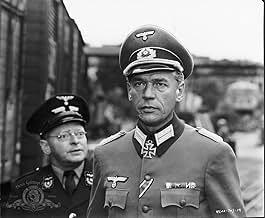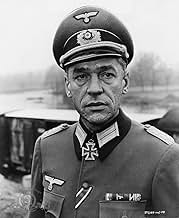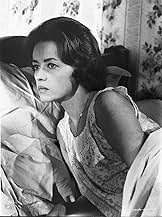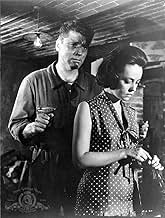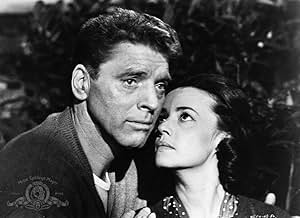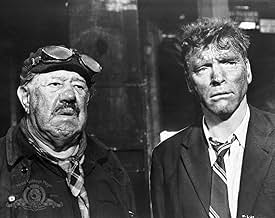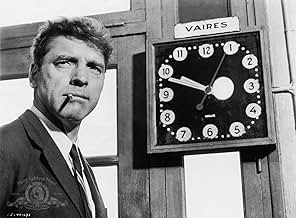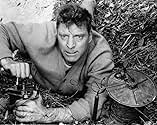En 1944, un colonel allemand charge un train de trésors de l'art français pour les envoyer en Allemagne. La Résistance, mise au courant de l'opération, va faire tout son possible pour arrête... Tout lireEn 1944, un colonel allemand charge un train de trésors de l'art français pour les envoyer en Allemagne. La Résistance, mise au courant de l'opération, va faire tout son possible pour arrêter le transfert sans endommager la cargaison.En 1944, un colonel allemand charge un train de trésors de l'art français pour les envoyer en Allemagne. La Résistance, mise au courant de l'opération, va faire tout son possible pour arrêter le transfert sans endommager la cargaison.
- Réalisation
- Scénario
- Casting principal
- Nommé pour 1 Oscar
- 1 victoire et 3 nominations au total
- Didont
- (as Albert Remy)
- General Von Lubitz
- (as Richard Munch)
- Sergeant Schwartz
- (as Donal O'Brien)
- Pilzer
- (as Art Brauss)
- Major
- (as Jean-Claude Berco)
Avis à la une
John Frankenheimer directs in stark black and white, and the film has his trademarks all over it -- kinetic compositions, rapid-fire editing, ragged documentary look and feel. Paul Scofield also stars as the obsessed Nazi and Jeanne Moreau has a role as a French woman who reluctantly aids and abets Lancaster. The sheer physical production is astounding; in the days before CGI would have done everything for them, Frankenheimer and company staged massive set pieces involving bombed railroad yards, crashing trains, you name it. I can only imagine how much pressure the special effects guys were under to get everything right the first time because re-staging it for a second try would have been a bear.
"The Train" brought Franklin Coen and Frank Davis an Academy Award nomination for Best Original Story and Screenplay at the 1965 Oscars.
Grade: A-
Seeing 'The Train' two days ago, what instantly came to my mind after watching was "wow!" Like most people here, to me this was a pretty exceptional film that really packs a punch in a way that not many films of its year, decade or even genre at this point of film history did. Truly powerful work that took risks and pulls no punches in a way that still has the ability to shock, no trivialising or sugar-coating here. Quite the opposite. As far as WWII films go, it is one of the best and despite being highly praised deservedly more people should know about it, it is really quite something and unlike a lot of films personally seen.
Maybe 'The Train' runs a little too long by about 15 minutes or so, which occasionally (emphasis on that word) affects the pace.
On occasions too early on, for my tastes Maurice Jarre's music score jarred a bit and like it belonged more in a comedy.
Conversely, there are so many strengths (which is actually pretty much everything else) and everything else is executed flawlessly. 'The Train' is quite masterful visually, the photography is full of atmosphere and played a huge part in making the train itself like its own character. Have never seen a train so cleverly, intimately and powerfully used. The French locations are incredibly well utilised, some of the best use of French locations for any film seen in a long time from personal view. On a technical level, the action with the train is enough to make the jaw drop today. Frankenheimer's direction is hugely accomplished and not since 'The Big Parade' as far as recent film viewings go has there been direction for any film that was this visually flawless. Most of Jarre's score works very well, when it becomes more subtle and more harmonious with the atmosphere it is quite hauntingly unsettling.
Script is very intelligent and thought-provoking, taut enough while allowing breathing space yet not rambling. The story is hugely compelling, is very intense especially the exciting action with the train and is emotionally powerful. Found myself quite moved and shocked at how much the more uncompromising moments (and there are many) wrenched the gut, haven't seen an ending this poetic in a while either. The characters are well defined and interesting. There are great performances from all, with Lancaster superb in one of his best performances. He tells so much with his face and eyes and could tell he meant every word with his line delivery, he is especially good in the last twenty minutes where words are few but one intensely feels his hurt and anger. Scofield has seldom been nastier or at times even frightening. Jeanne Moreau's role isn't huge but she is sympathetic in it and an atypically cast Michel Simon is very telling in his.
In summary, exceptional and one of the best WWII films. 9/10
Almost everything that Burt Lancaster does, or experiences in John Frankenheimer's, THE TRAIN seems real, necessary and interesting. He did all his own stunts in the film, learned to cast driving axle-bearings, which we see in the film in a continuous take. Frankenheimer was one of the true masters of the audacious, complicated, continuous scene and this film has many astounding set-pieces. The film is also one of the last great films shot in deep focus black and white (mostly with a 25mm lens) and it is the bold, striking compositions of the intense and vigorous action that elevates the film to an even higher level. Frankenheimer never took the bland, straightforward choices of blocking and positioning the camera in his films - certainly not in the first half of his career and THE TRAIN is a veritable textbook in imaginative visual directing.
There is great sense of danger in the film, much like the feeling that THE WAGES OF FEAR produces - and indeed in one scene, we see an actual train-crash that smashed nine cameras, and was only captured by one camera which yielded one of the most startling shots in all of Cinema! The whole film has sense of almost reckless daring, but was carefully controlled throughout. The scene where Albert Rémy uncouples the engine from the cars is insane! I can't think of another film where a key actor does something so dangerous on their own, with a stunt double.
But all of these scenes and shots serve the story, which is in itself fascinating. It asks the question: What is more important - irreplaceable works of art or the lives of common human beings? Col. von Waldheim is an unorthodox Nazi, who has a deep admiration for 'decadent' paintings and is willing to save them possess or save them at any cost , regardless of his orders. Paul Labiche knows trains inside out, but a painting means as much to him as "a string of pearls to an ape," but his morals are infinitely more compassionate than von Waldheim, which he makes clear without speech at the end - where, in fact, twenty minutes go by without Lancaster uttering a single word, which was unheard of them of a superstar male actor, but it totally appropriate. It is one of the great performances in all of war/action Cinema, I feel. And his antagonist is the legendary Paul Scofield in his first screen appearance in six years, who is, as always, magnificent. Everyone did a first-rate job on this film, yet only the screenwriters were nominated for the 1966 Oscars (the film was not released until May 1965 in the USA) which is yet another example of Academy madness.
Everything about THE TRAIN is unconventional. It was made at a time when other studios and directors would have gone for colour and CinemaScope, Frankenheimer went for deep-focus, black and white 1.66:1, went for authenticity, verisimilitude - no back-projection or models. Arthur Penn actually began the film, but I have never been able to ascertain how much material he shot, or why he was fired, but it would have been a very different movie; Frankenheimer's vigorous, but elegant style is so perfectly right for this film.
One thing that makes some films extra special is those that have many scenes where a process is at work and is shown in detail, seem more powerful. One cannot shown process in any other medium of art. Heist scenes, as in THE ASPHALT JUNGLE, RIFIFI, LE CERCLE ROUGE, etc are prime examples, the escape preparations in Robert Bresson's, A MAN ESCAPED and Jacques Becker's, LE TROU are also enthralling and 'make' each movie what it is. The working out of a life-or-death puzzle, as in BLOW-UP, THE CONVERSATION and De Palma's, BLOW OUT also illustrate the power of the medium. What makes these scenes - 'process of action' - interesting and occasionally powerful, is that they make us look at human interaction with matter is a different, even deeper way. Slow motion cinematography remains one of man's greatest inventions. Before it, we had no idea how fast moving objects worked or behaved. There was over 50 years of gunfire in Cinema, until we saw what a bullet leaving the barrel of a gun looked like, in THE OMEN (1976). It spins, for one thing. That must have surprised many people.
On the whole and after seeing it for the first time in about six years, I firmly feel that THE TRAIN is one of the greatest action films ever made, not only for its audacious crashes, bold style and unobtrusive score by Maurice Jarre, but also for it simply being a fascinating and unusual story this is brilliantly acted.
The film begins in Paris, August 2, 1944
It's 1511th day of German occupation The liberation of Paris seems very close
Nazi Colonel Von Waldheim (Paul Scofield) decides suddenly to remove by train to Germany the best of Impressionist masterpieces His objective is clear: "Money is a weapon. The contents are as negotiable as gold and more valuable."
Mademoiselle Villard (Suzanne Flon) informs the Resistance of the shipment The Resistance reaction is to stop the train without damaging the national heritage "They are part of France." But stopping the train is not a simple task You can get killed especially if you are French and the train is German
Labiche (Burt Lancaster), the Chief Inspector of the French Railway System, is not impressed However, he never communicates his political, ideological, or nationalistic convictions, "For certain things, we take the risk," he said; "but I won't waste lives on paintings."
When an aged engineer, Papa Boule (Michel Simon), is accused of sabotage in spite of saving the train through the Allied's bombs at the risk of his own life, Labiche is forced into combat
It begins with a long sequence where an armament train and the art train are both trying to leave the yard in the morning As they are being moved back and forth across the tracks, the viewer knows that British planes will hit the yard in that moment at exactly 10:00 o'clock
New complications are introduced, but the central conflict always returns to an obsessive art lover against a man with no appreciation for art Labiche's only concerns is to slow down the Nazis keeping himself and his compatriots alive
Now, two forces control the film The first is Frankenheimer's cleverness to choreograph the real trains Frankenheimer and his cinematographers capture the heat of the engines, the noise and sound of the cars in motion, the fault in the oil line, the crushing strength implicated when the machines come into collision and the derailment The second force is Lancaster, the "headache" of the fanatical obsessed Colonel whose desire is to see the priceless paintings in Nazi Germany...
Le saviez-vous
- AnecdotesBurt Lancaster performed all his own stunts in this movie. Albert Rémy also got into the act by performing the stunt of uncoupling the engine from the paintings train on a real moving train.
- GaffesWhen the German officer in the train thinks they've arrived in Germany, he takes a look at his map and we see Strasbourg (Alsace, France), the France-Germany border and Baaden-Baaden (Germany). During German occupation of France, Alsace and Strasbourg were annexed to the German Reich, i.e. this German military map should have shown a different border (100 km West) and Strasbourg should have been in Germany.
- Citations
Colonel von Waldheim: Labiche! Here's your prize, Labiche. Some of the greatest paintings in the world. Does it please you, Labiche? Give you a sense of excitement in just being near them? A painting means as much to you as a string of pearls to an ape. You won by sheer luck: you stopped me without knowing what you were doing, or why. You are nothing, Labiche -- a lump of flesh. The paintings are mine; they always will be; beauty belongs to the man who can appreciate it! They will always belong to me or to a man like me. Now, this minute, you couldn't tell me why you did what you did.
- Crédits fousOpening credits prologue: PARIS August 2-1944 1511th day of German occupation
- Versions alternativesWhilst the official run time is 133 minutes, the BBFC website has two separate entries, one with a theatrical 'U' rated certificate in 1964 running at 141 minutes 31 seconds and the other entry with a theatrical 'A' rated certificate in 1959 running at 90 minutes 37 seconds. Though the second entry seems incorrect due to the erroneous date of certification being 21 October 1959 (the film was being made in 1963 and is copyrighted in 1964) and a much shorter run time, the BBFC reference numbering is in sequence with the later video rated entries so it is unknown if this 1959 entry is a much shorter cut of this film or this is an error in the BBFC records. It is also not known if the 142 minute entry is a longer cut of the film that has simply not been since it's UK theatrical release in 1964.
- ConnexionsFeatured in Film Review: Burt Lancaster (1968)
Meilleurs choix
- How long is The Train?Alimenté par Alexa
Détails
- Date de sortie
- Pays d’origine
- Langues
- Aussi connu sous le nom de
- El tren
- Lieux de tournage
- Acquigny, Eure, France(trains pile-up, 49°10'22.73"N, 1°10'44.84"E)
- Sociétés de production
- Voir plus de crédits d'entreprise sur IMDbPro
Box-office
- Budget
- 6 700 000 $US (estimé)
- Durée2 heures 13 minutes
- Couleur
- Rapport de forme
- 1.66 : 1
Contribuer à cette page



